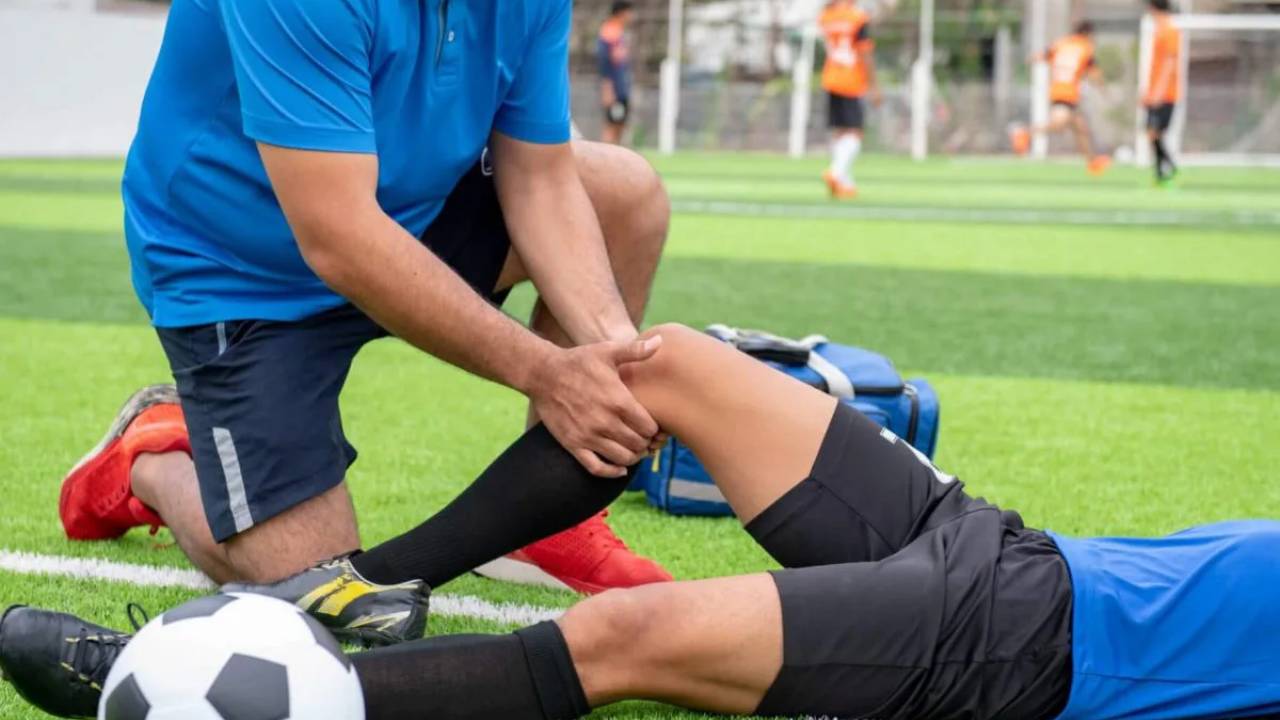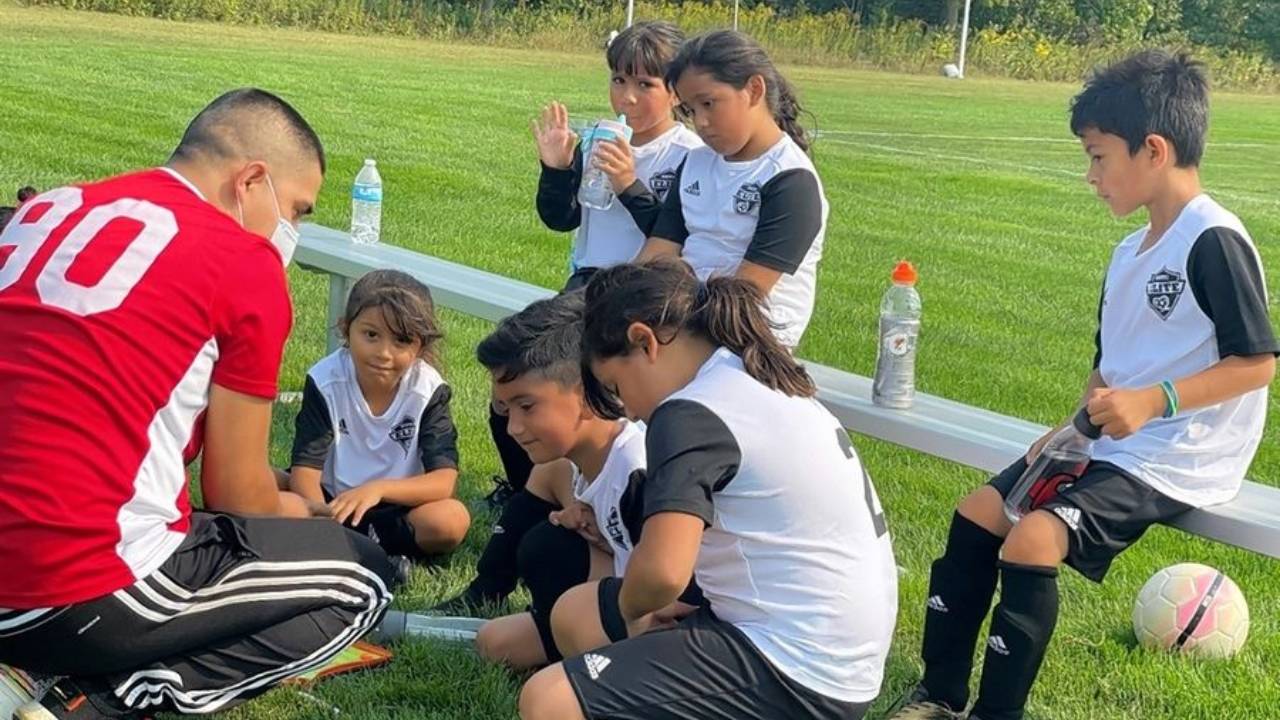A soccer coach plays a crucial and exciting role in helping players grow and become better at the game. Just like a teacher guides students in their learning journey, a soccer coach guides young players in their soccer journey. They teach them important skills, help them understand the game, and encourage them to do their best. A coach is like a friend and a mentor who supports players and helps them become stronger, faster, and smarter on the soccer field.
In this article, we will explore the important job of a soccer coach in helping players develop their skills and become the best they can be. Additionally, we will also learn about the different ways coaches help players improve their game, both physically and mentally.
I. Guiding Players Towards Excellence

A soccer coach is like a helpful guide who supports players in their soccer journey and helps them become better at the game. The coach watches players closely during practice and games, providing valuable feedback to help them improve. They offer advice and suggestions to enhance their skills, making sure players understand their strengths and areas for improvement.
Moreover, coaches use positive reinforcement to motivate players and boost their confidence. They celebrate their successes and encourage them to keep trying their best. By setting clear goals, coaches enable players to track their progress and stay motivated. They break down big goals into smaller, achievable steps, helping players stay focused and determined.
Furthermore, coaches emphasize the importance of fair play, respect, and teamwork. They teach players to be good sports, showing respect for teammates and opponents alike. Coaches create a positive and inclusive team culture where everyone feels valued and supported. They encourage players to support and encourage each other, fostering a sense of unity and camaraderie.
In conclusion, a soccer coach plays a vital role in guiding players toward excellence. They offer feedback, set goals, and instill important values. With their guidance, players can improve their skills, stay motivated, and develop as individuals. The coach-player relationship is a partnership where both work together towards success on and off the field. Through their guidance and support, coaches help players reach their full potential and become the best they can be.
II. Technical Training for Enhanced Performance

Technical training is an important aspect of soccer development, and a coach plays a key role in helping players enhance their performance. A soccer coach teaches players various technical skills, such as passing, shooting, dribbling, and ball control. They guide players through drills and exercises to refine these techniques and improve their overall game.
Additionally, coaches emphasize the importance of mastering ball manipulation, agility, balance, and coordination. They introduce players to different drills that focus on these skills, helping them become more comfortable and confident with the ball. Through repetitive practice and guidance, coaches enable players to develop their technical abilities and become more effective on the field.
Furthermore, coaches incorporate progressive training methods to challenge players and facilitate their growth. They introduce new exercises and gradually increase the difficulty level to ensure continuous improvement. By providing a variety of training activities, coaches keep players engaged and motivated to learn and develop their technical skills.
Moreover, coaches create a supportive learning environment where players feel encouraged to take risks and make mistakes. They understand that mistakes are a natural part of the learning process and provide constructive feedback to help players correct and improve their techniques. This positive and nurturing approach allows players to build confidence in their technical abilities and strive for excellence.
In conclusion, technical training under the guidance of a soccer coach is essential for enhancing player performance. Coaches teach and refine technical skills, emphasize key attributes like ball manipulation and coordination, and use progressive training methods to challenge players. By creating a supportive environment, coaches enable players to develop their technical abilities and gain confidence on the soccer field.
III. Tactical Awareness and Decision-Making Abilities

In addition to technical skills, a soccer coach plays a vital role in developing players’ tactical awareness and decision-making abilities. Tactical awareness refers to understanding the game, including strategies, formations, and positioning. A coach helps players comprehend these aspects and guides them in making effective decisions on the field.
Moreover, coaches introduce players to different game scenarios and teach them how to analyze and react to each situation. They explain the importance of teamwork, communication, and spatial awareness. By using drills and small-sided games, coaches provide opportunities for players to practice their decision-making skills in a realistic and controlled environment.
Furthermore, coaches foster effective communication among players, encouraging them to work as a cohesive unit. They teach players to communicate with each other, sharing information about opponent positions, open spaces, and potential passing opportunities. This communication enhances players’ decision-making abilities, as they learn to assess the field and make quick, informed choices based on the information received.
Additionally, coaches emphasize the significance of adapting strategies and tactics based on the flow of the game. They teach players to be flexible and adjust their approach depending on the opponents’ strengths and weaknesses. This adaptability enhances players’ tactical awareness and empowers them to make intelligent decisions that can lead to success on the field.
In conclusion, a soccer coach plays a crucial role in developing players’ tactical awareness and decision-making abilities. By teaching strategies, encouraging effective communication, and fostering adaptability, coaches empower players to understand the game and make informed choices. These skills not only contribute to their success on the soccer field but also have applications in various aspects of life.
IV. Physical Conditioning and Injury Prevention

Physical conditioning and injury prevention are essential aspects of player development, and a soccer coach plays a significant role in ensuring players’ fitness and well-being. Coaches design training programs to improve players’ endurance, speed, agility, and strength, which are important for performing at their best on the field.
Moreover, coaches emphasize the importance of proper warm-up exercises and stretching routines to prepare players’ bodies for physical activity. They teach players how to take care of their bodies by promoting hydration, rest, and nutrition. These practices help prevent injuries and promote overall health and well-being.
Furthermore, coaches educate players about injury prevention techniques, such as correct body mechanics, proper tackling and heading techniques, and the use of protective equipment. By teaching players how to play safely and reduce the risk of injuries, coaches ensure that players can enjoy the game while minimizing the chance of harm.
Additionally, coaches monitor players’ physical condition and provide guidance on recovery and rest periods. They encourage players to listen to their bodies, rest when needed, and seek medical attention when necessary. By prioritizing players’ health, coaches contribute to their long-term development and longevity in the sport.
In conclusion, a soccer coach plays a vital role in the physical conditioning and injury prevention of players. By designing training programs, promoting proper warm-up and stretching routines, and educating players about injury prevention, coaches ensure players’ fitness and well-being. This not only enhances their performance on the field but also contributes to their long-term health and enjoyment of the game.
V. Psychological Development and Mental Toughness

In addition to physical skills, a soccer coach plays a crucial role in the psychological development and mental toughness of players. They understand that soccer is not only a physically demanding sport but also a mentally challenging one. Coaches work on developing players’ psychological skills to help them overcome obstacles and perform at their best, even in high-pressure situations.
Moreover, coaches instill confidence in players by providing positive reinforcement and celebrating their successes. They help players believe in their abilities and encourage them to take risks and embrace challenges. This positive mindset boosts players’ self-esteem and prepares them to face adversity with resilience.
Furthermore, coaches teach players strategies to manage stress and stay focused during games. They guide players in maintaining concentration, controlling emotions, and making clear decisions under pressure. By helping players develop mental discipline, coaches enable them to perform consistently and effectively in competitive situations.
Additionally, coaches foster a supportive team culture that promotes inclusivity, respect, and sportsmanship. They emphasize the importance of teamwork and encourage players to support and encourage one another. This positive team environment enhances players’ psychological well-being and creates a sense of unity and camaraderie.
In conclusion, a soccer coach plays a vital role in the psychological development and mental toughness of players. By fostering confidence, teaching stress management techniques, and promoting a positive team culture, coaches enable players to overcome challenges and perform at their best. These psychological skills not only contribute to success in soccer but also have broader applications in life.
VI. Building Character and Life Skills

A soccer coach goes beyond teaching the game and plays a significant role in building the character and life skills of players. They understand the importance of using soccer as a platform to instill values and help players grow as individuals.
Coaches teach valuable life skills such as discipline, teamwork, perseverance, and leadership. They emphasize the importance of being committed, showing respect to teammates and opponents, and demonstrating good sportsmanship. These qualities contribute not only to success in the field but also to success in other areas of life.
Moreover, coaches encourage players to set goals and work towards achieving them. They teach players to manage their time effectively, prioritize their commitments, and make responsible choices. By instilling these skills, coaches prepare players for future endeavors and promote personal growth.
Furthermore, coaches serve as mentors and role models for players. They lead by example, displaying qualities such as integrity, fairness, and dedication. Through their guidance and support, coaches inspire players to strive for excellence both on and off the field.
Additionally, coaches create a positive and inclusive team culture where players feel supported and valued. They encourage players to embrace diversity, celebrate differences, and treat each other with kindness and respect. These values shape players into compassionate and empathetic individuals.
In conclusion, a soccer coach plays a vital role in building the character and life skills of players. Through teaching life skills, setting goals, serving as role models, and fostering a positive team culture, coaches prepare players for success beyond the soccer field. The impact of their guidance extends far beyond the game, shaping players into well-rounded individuals ready to face the challenges of life.
Conclusion
In conclusion, the role of a soccer coach in player development is truly vital. Coaches serve as mentors, guiding players towards excellence in both their skills and character. They focus on technical training, tactical awareness, physical conditioning, psychological development, and building life skills. Through their guidance, players are empowered to reach their full potential and become well-rounded individuals on and off the field.
If you’re a soccer player or a parent seeking a dedicated and experienced coach, look no further. Invest in the guidance and expertise of a qualified soccer coach to help you or your child unlock new levels of skill and achievement. Remember, the journey to becoming a great soccer player begins with a skilled coach by your side.
And when it comes to gearing up for the game, trust Rompvela International, a leading manufacturer of sportswear. With their commitment to quality and performance, Rompvela offers a wide range of sports apparel designed to enhance your comfort and maximize your potential on the soccer field. Visit their website to explore their collection and gear up for success.
With the right coach and the right gear, you or your child can embark on an exciting journey of soccer development. Embrace the opportunities, work hard, and enjoy the beautiful game while reaching new heights of skill and personal growth. The world of soccer is waiting for you!

